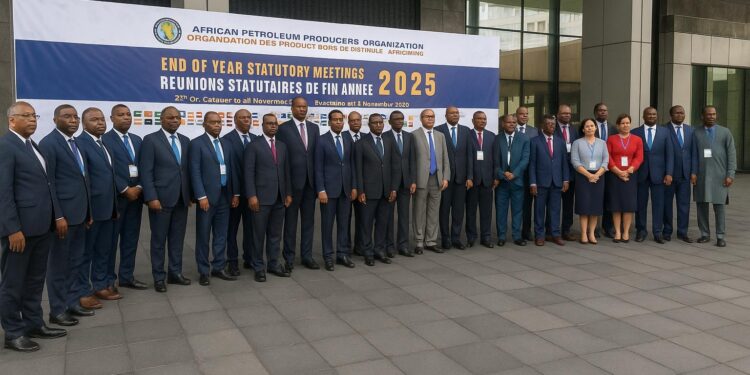Brazzaville Hosts Back-to-Back APPO Meetings
Kintélé, the fast-growing suburban hub of Brazzaville, welcomed ministers and experts from 15 member states for the African Petroleum Producers’ Organization’s 25th Executive Council on 31 October 2025 and its 48th Ministerial Council on 4 November, events scheduled alongside the Local Content Africa Fair 2025.
Congolese Diplomacy in the Spotlight
Outgoing APPO president Bruno Jean-Richard Itoua, Congo-Brazzaville’s Minister of Hydrocarbons, opened proceedings by praising “unity and professionalism” among delegates, underscoring that the country’s logistical preparations reflected a commitment to collective energy security, according to the official communiqué released after the meetings.
Leadership Transfer Signals Regional Continuity
Ministers elected Ivory Coast’s Mines, Petroleum and Gas head, Mamadou Sangafowa-Coulibaly, as APPO president for 2026. The vice-presidency goes to the Democratic Republic of Congo, represented by Minister of State for Hydrocarbons Acacia Bandubola Mbongo, ensuring geographic balance between West and Central Africa and continuity for policy initiatives launched since 2018.
Seasoned Technocrat Becomes Secretary General
Algeria’s Farid Ghezali was appointed Secretary General for 2026-2028, succeeding Nigeria’s Dr Omar Farouk Ibrahim. Delegations thanked Ibrahim for restoring APPO’s international standing during a pandemic-marred six-year term; Ghezali pledged to deepen reforms aimed at making the body “an investment catalyst rather than a discussion club.”
Energy Bank Nears Lift-Off
Itoua confirmed that 70 percent of the planned US $500 million capital of the African Energy Bank has been subscribed, with the Brazzaville headquarters building reportedly over 90 percent complete. He reiterated the target of operational launch before year-end 2025, a milestone designed to unlock competitive financing for upstream and midstream projects.
Financing Imperatives for Producers
Officials highlighted that traditional lenders are retreating from hydrocarbon funding amid global decarbonisation pressure. By pooling resources in a continent-led institution, APPO members intend to cushion investment cycles, preserve revenue streams and support gradual diversification without jeopardising fiscal stability, especially for emerging producers such as Niger and Senegal.
Governance Reform Advances
Delegates reviewed implementation of the 2018 overhaul that trimmed secretariat bureaucracy and introduced performance indicators for joint ventures. Bienvenu Essé Kouamé of Ivory Coast, speaking for the Executive Council, urged countries to “place collective interest above national agendas” to accelerate documentation ratification and align domestic laws with the updated APPO charter.
Transition Debates Dominate Agenda
While hydrocarbons remain central to member budgets, ministers acknowledged mounting climate commitments. Working groups evaluated carbon-capture pilots in Algeria and Congo, gas-fired power expansion in Côte d’Ivoire, and flare-reduction targets in Gabon. The final communiqué stresses “a just, orderly and profitable transition” that leverages Africa’s natural gas as a bridge fuel.
South-South Cooperation Opportunities
Panels explored joint seismic studies in under-explored basins, standardised service contracts and shared training centres. Nigeria’s NNPC Limited proposed a knowledge-transfer platform modelled on OPEC’s Secretariat Library, while Angola’s Sonangol pitched co-investment in FPSO refurbishment. Several items will be tabled for formal approval at the next council in Abidjan.
Elevating Local Content Ambitions
The parallel Local Content Africa Fair attracted suppliers, startups and universities showcasing modular refineries, corrosion-resistant alloys and digital-twin solutions. Congo’s National Content Committee reported that local procurement accounted for 46 percent of upstream spending in 2024, up seven points year-on-year, exceeding the sub-regional average according to data presented by consultants IHS Markit.
Investor Signals from Brazzaville
International investors noted the blend of pragmatism and solidarity emanating from Kintélé. “A functioning Energy Bank could de-risk greenfield developments and draw private capital back,” said Rystad Energy analyst Aïssatou Diop on the sidelines. Ratings agencies will monitor whether equity contributions materialise on schedule to avoid contingent liabilities for sovereign treasuries.
Congo’s Domestic Pay-Off
By aligning high-profile meetings with a trade exhibition, Brazzaville demonstrated conference infrastructure and positioned itself as an energy diplomacy hub. Hoteliers reported occupancy rates above 85 percent during the week, while the Chamber of Commerce estimated direct spending of CFA 3 billion, modest yet welcome amid broader diversification efforts.
Balancing Hydrocarbons and Climate
Congo highlighted its peat-rich Cuvette Centrale as a global carbon sink in bilateral meetings with Norway and the United Arab Emirates, arguing that responsible oil exploitation can co-exist with large-scale conservation. Observers view this dual narrative as increasingly central to garnering concessional finance and voluntary carbon-market revenues.
Women Leaders Gain Visibility
Acacia Bandubola Mbongo’s election reflects a gradual rise of female leadership in a sector still dominated by men. Uganda’s Minister of Energy Ruth Nankabirwa and Ghana National Petroleum Corporation’s deputy CEO Josephine Anokye offered mentorship sessions, and APPO committed to sponsor scholarships for 30 female petroleum engineers in 2026.
Next Steps on the Calendar
Technical committees will meet in Luanda during March 2026 to finalise Energy Bank governance bylaws, while the 49th Ministerial Council is scheduled for Abidjan in November 2026. Progress will be benchmarked against clear metrics, including bank disbursement volumes, local content ratios and greenhouse-gas intensity per barrel produced.
Cautious Optimism Among Stakeholders
Industry players welcomed leadership rotation as a sign of institutional maturity. Analysts at Standard Bank foresee that a capitalised Energy Bank could cut project costs by up to 150 basis points. However, they caution that foreign-exchange liquidity and political coordination remain preconditions to realising APPO’s ambitions.
A Continental Vision Consolidated
From the bustling halls of the Grand Hôtel de Kintélé, ministers departed with renewed pledges to pool resources and speak with one voice on the global stage. For Congo-Brazzaville, the successful hand-over reinforced its reputation as an effective convener, while investors left with clearer sightlines on Africa’s evolving energy architecture.











































